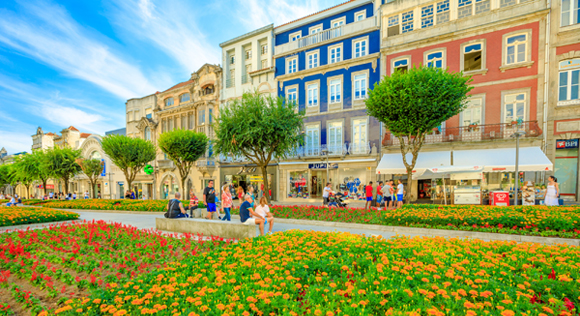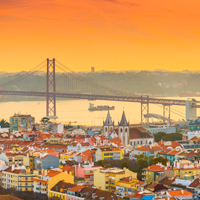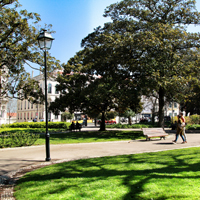Moving to Braga, Portugal
Last updated on Oct 15, 2024
Summary: Moving to Braga, Portugal? Expats talk about what you need to know before moving to Braga.

What do I need to know before moving to Braga?
When we asked people what advice they would give someone preparing to move to Braga, they said:
"Braga is a city rich in history and culture, with a vibrant social scene and a high quality of life. Before moving to Braga, expats should know that the official language is Portuguese, and while English is commonly spoken in tourist areas and by younger generations, it may not be widely understood by older locals. The cost of living in Braga is relatively low compared to other European cities, but it's still important to budget carefully. The city has a Mediterranean climate, with hot summers and mild, rainy winters. Braga is known for its stunning architecture, including numerous churches and other historic buildings. The city is also home to a number of festivals and events throughout the year, which can be a great way to immerse yourself in the local culture. Public transportation in Braga is reliable and affordable, with a network of buses serving the city and surrounding areas. However, many expats choose to drive, and it's worth noting that Portuguese driving laws may be different from those in your home country. Healthcare in Portugal is of a high standard, and expats living in Braga will have access to both public and private healthcare facilities. It's recommended to have comprehensive health insurance to cover any medical costs. Portuguese cuisine is a highlight of living in Braga, with a focus on fresh seafood, locally grown fruits and vegetables, and delicious pastries. Finally, it's important to note that while Portugal is generally a safe country, it's still necessary to take common-sense precautions to protect yourself and your belongings," remarked one expat who made the move to Braga.
"I would recommend Gualtar or Trofa as an area of Braga to live in. It's part of the city, yet doesn't have the "city" feel. It's atmosphere is more "suburban" than anything. The city has everything you need to live a life that you've been accustomed to in the US. Additionally, it's location is spectacular because you have the beach 30 minutes to the west, (awsome) Geres mountains 15 minutes to the east and Spain 40 minutes to the North.... you can't go wrong. :)," explained one expat living in Braga, Portugal.
How do I find a place to live in Braga?
We asked expats how they chose their neighborhood and found a place to live. They answered:
"I first lived in an apartment near the University. You can never go wrong living around a large school. People tend to be more open to help. I eventually bought a proprty and built a four bedroom home in a quiet section of the city. The land was a bit more expensive than other areas but it was well worth it. If your going to build.... please watch your contractor closely and NEVER pay for anything up front, only for work that has been done. You can get yourself into trouble that way," remarked one expat in Braga, Portugal.
"Finding a place to live in Braga involves several steps. First, you need to determine your budget and the type of accommodation you're looking for. This could range from a small apartment to a larger family home. Next, you should research the different neighborhoods in Braga to find one that suits your lifestyle and preferences. Some popular areas include the historic city center, São Vicente, and São Vítor. Once you have a clear idea of what you're looking for, you can start your search. There are several online platforms that list properties for rent or sale in Braga, such as Idealista, OLX, and Imovirtual. These websites allow you to filter your search based on location, price, size, and other features. In addition to online searches, you might also consider hiring a real estate agent. They can provide valuable local knowledge and help you navigate the process of finding a home. When you find a property you're interested in, arrange a viewing. This will give you a chance to inspect the property and ask any questions. If you're planning to rent, you'll likely need to provide some documentation, such as proof of income and a reference from a previous landlord. If you're buying, you'll need to negotiate the price and arrange for a mortgage if necessary. Finally, once you've found a place and everything is in order, you can sign the lease or purchase agreement and move in. Remember, finding a place to live can take time, so it's important to be patient and thorough in your search," said one expat in Braga.
What is a typical expat home or apartment like in Braga?
"A typical expat home or apartment in Braga, is often located in the city center or in the suburbs, depending on the individual's preference for city life or a more relaxed environment. These homes are usually modern and well-maintained, with a blend of traditional Portuguese architecture and contemporary design. They often feature spacious living areas, fully equipped kitchens, and one to three bedrooms. Some apartments may come with a balcony or terrace, offering views of the city or the surrounding countryside. Many expat homes also have access to amenities such as a communal swimming pool, garden, or gym. Despite being in a foreign country, these homes are designed to provide all the comforts of modern living, making it easier for expats to settle in. The neighborhoods are generally safe and peaceful, with local shops, restaurants, and public transportation nearby," said one expat who made the move to Braga.
"I live in a single family four bedroom home. To be honest I don't really know of any US expats in my area. The people up north are very friendly, so most of our support circle is Portuguese," explained one expat living in Braga, Portugal.
What is the average cost of housing in Braga?
If you are thinking about moving to Braga, cost of living in probably a key consideration. Expats commented about the cost of housing:
"The average cost of housing in Braga can vary greatly depending on the location and size of the property. However, as of recent data, it is generally affordable compared to other European cities. For instance, you can expect to pay a moderate amount for a one-bedroom apartment in the city center, while the same kind of property outside the city center would cost significantly less. Prices for larger apartments or houses would naturally be higher. It's also worth noting that buying property in Braga is also relatively affordable, with the price per square meter for an apartment in the city center being quite reasonable," said one expat in Braga.
"My home loan was 200k euros and I pay around 600 euros a month. Property takes is another 1k a year and generally speaking water, electric, heating, cable tv and such round off to about 350 euros monthly. It's MUCH cheaper out here than in the US," said one expat who made the move to Braga.
Should I buy or rent a home in Braga?
If you have not spent a lot of time in Braga, you should rent before even thinking about buying. We asked expats there about the buy vs. rent decision:
"The decision to buy or rent a home in Braga, largely depends on your personal circumstances, financial situation, and long-term plans. If you plan to stay in Braga for a long period, buying a home could be a good investment. Owning a home allows you to build equity over time and could provide financial security in the future. However, buying a home also comes with additional costs such as property taxes, maintenance, and insurance, which you should consider. It also requires a significant upfront investment, including a down payment and closing costs. On the other hand, renting a home in Braga could be a more flexible option, especially if you're not sure about your long-term plans. Renting allows you to move more easily if your circumstances change, and it often comes with fewer responsibilities as your landlord will typically handle maintenance and repairs. Renting can also be more affordable in the short term, as it usually requires a smaller upfront cost than buying. However, you won't build equity as you would if you owned the property. In conclusion, both buying and renting have their pros and cons, and the best choice depends on your individual situation. It's important to carefully consider your financial situation, lifestyle, and future plans before making a decision," remarked one expat in Braga, Portugal.
What should I pack when moving to Braga?
We asked people living in Braga to list three things they wish they had brought and three they wish they had left behind. They responded:
"Three things I wish I would have brought my golf clubs, my dog & my furniture. Three things I wish I would have left are all of my kitchen appliances (converters burn out quckly here)... that's about it," remarked one expat in Braga, Portugal.
"When moving to Braga, you should pack a variety of clothing suitable for a Mediterranean climate, including lightweight clothing for the warm summers and heavier clothing for the cooler winters. Don't forget to pack a good quality raincoat and umbrella, as Braga is known for its rainy winters. Pack comfortable walking shoes, as the city is best explored on foot. Also, bring a hat, sunglasses, and sunscreen to protect yourself from the sun. If you plan on swimming, pack a swimsuit, beach towel, and flip flops. Bring all necessary toiletries, but keep in mind that most items can be purchased locally. Pack any prescription medications you need, along with a copy of your prescription. Don't forget to bring your passport, driver's license, and other necessary identification. If you plan on working or studying, bring any necessary paperwork, such as work permits or school transcripts. Pack a Portuguese phrasebook or dictionary to help with the language barrier. Bring a power adapter for your electronics, as Portugal uses a different plug type than many other countries. Lastly, pack personal items that will make your new place feel like home, such as photos or favorite books," said one expat in Braga.
 Portugal Residency Advisors
Portugal Residency AdvisorsConnect
Portugal Residency Advisors is a full-service consulting firm dedicated to providing personalized services to individuals and families seeking to relocate to Portugal. With a team of experienced professionals and strategic partnerships, we are well-positioned to assist clients with all aspects of the relocation process.
Click connect to have our partner contact you via e-mail and/or phone.
 Portugal Residency Advisors
Portugal Residency AdvisorsPortugal Residency Advisors is a full-service consulting firm dedicated to providing personalized services to individuals and families seeking to relocate to Portugal. With a team of experienced professionals and strategic partnerships, we are well-positioned to assist clients with all aspects of the relocation process.
Connect
Click connect to have our partner contact you via e-mail and/or phone.
What cultural faux pas should I try to avoid making in Braga?
We asked people in Braga if they could share any humorous cultural blunders they commited. For new expats, keep in mind that these incidents are an inevitable part of expat life. Learning to laugh about them is the key!:
"When visiting Braga, it's important to respect the local customs and traditions to avoid any cultural faux pas. Here are some tips: Avoid discussing politics, especially the Salazar regime and the Carnation Revolution, as these topics can be sensitive. Portuguese people value punctuality. Being late can be seen as disrespectful, so always try to be on time for appointments or social gatherings. In Portugal, it's considered rude to interrupt someone while they're speaking. Always wait for your turn to speak. Don't use a lot of hand gestures while talking. Portuguese people generally don't use as many hand gestures as other Southern Europeans, and excessive gesturing can be seen as theatrical or insincere. Avoid asking personal questions, especially about income or personal life, unless you know the person well. Portuguese people value their privacy. Don't rush your meals. In Portugal, meals are a time to relax and enjoy the company of others. Rushing through a meal can be seen as rude. Avoid wearing beachwear or overly casual clothing in churches or other religious sites. This can be seen as disrespectful. Don't forget to say "please" and "thank you". Portuguese people are polite and appreciate good manners. Avoid making loud noises or speaking loudly in public places. Portuguese people are generally quiet and reserved, and loud behavior can be seen as rude. Don't assume everyone speaks English. While many Portuguese people do speak English, especially in tourist areas, it's polite to ask if they speak English before starting a conversation," explained one expat living in Braga, Portugal.
About the Author
 Betsy Burlingame is one of the founders of Digital Nomad Exchange and the Founder and President of Expat Exchange. She launched Expat Exchange in 1997 as her Master's thesis project at NYU. Prior to Expat Exchange and Digital Nomad Exchange, Betsy worked at AT&T in International
and Mass Market Marketing. She graduated from Ohio Wesleyan University
with a BA in International Business and German.
Betsy Burlingame is one of the founders of Digital Nomad Exchange and the Founder and President of Expat Exchange. She launched Expat Exchange in 1997 as her Master's thesis project at NYU. Prior to Expat Exchange and Digital Nomad Exchange, Betsy worked at AT&T in International
and Mass Market Marketing. She graduated from Ohio Wesleyan University
with a BA in International Business and German.
Some of Betsy's articles include 12 Best Places to Live in Portugal, 7 Best Places to Live in Panama and 12 Things to Know Before Moving to the Dominican Republic. Betsy loves to travel and spend time with her family. Connect with Betsy on LinkedIn.

Get a quote in 2 minutes from our partner, Cigna Global Health.
Get Quote
![]() Portugal Forum
Portugal Forum
Talk with other digital nomads and expats in Portugal on our Portugal forum - meet people, get advice and help others.
![]() Contribute
Contribute
Help others in Portugal by answering questions about the challenges and adventures of living in Portugal.
Digital Nomads in Portugal offer advice about healthcare, hospital visits, emergency rooms visits, finding a doctor and buying health insurance in Portugal.

 Braga, Portugal
Braga, Portugal


